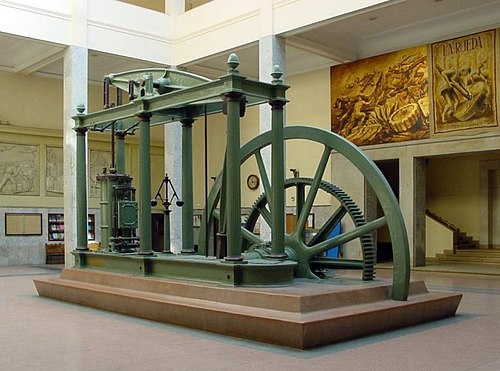Revolveverb
(intransitive) To orbit a central point.
Revolveverb
(intransitive) To turn on an axis.
Revolveverb
(transitive) To cause to turn.
Revolveverb
(intransitive) To recur in cycles.
Revolveverb
(transitive) To ponder on; to reflect repeatedly upon; to consider all aspects of.
Revolvenoun
The rotation of part of the scenery within a theatrical production.
Revolvenoun
(obsolete) A radical change; revolution.
Revolveverb
To turn or roll round on, or as on, an axis, like a wheel; to rotate, - which is the more specific word in this sense.
Revolveverb
To move in a curved path round a center; as, the planets revolve round the sun.
Revolveverb
To pass in cycles; as, the centuries revolve.
Revolveverb
To return; to pass.
Revolveverb
To cause to turn, as on an axis.
Revolveverb
Hence, to turn over and over in the mind; to reflect repeatedly upon; to consider all aspects of.
Revolveverb
turn on or around an axis or a center;
Revolveverb
move in an orbit;
Revolveverb
cause to move by turning over or in a circular manner of as if on an axis;
Revolutionnoun
A political upheaval in a government or nation state characterized by great change.
Revolutionnoun
The removal and replacement of a government, especially by sudden violent action.
Revolutionnoun
Rotation: the turning of an object around an axis.
Revolutionnoun
A rotation: one complete turn of an object during rotation.
Revolutionnoun
In the case of celestial bodies - the traversal of one body through an orbit around another body.
Revolutionnoun
A sudden, vast change in a situation, a discipline, or the way of thinking and behaving.
Revolutionnoun
A round of periodic changes, such as between the seasons of the year.
Revolutionnoun
Consideration of an idea; the act of revolving something in the mind.
Revolutionnoun
The act of revolving, or turning round on an axis or a center; the motion of a body round a fixed point or line; rotation; as, the revolution of a wheel, of a top, of the earth on its axis, etc.
Revolutionnoun
Return to a point before occupied, or to a point relatively the same; a rolling back; return; as, revolution in an ellipse or spiral.
Revolutionnoun
The space measured by the regular return of a revolving body; the period made by the regular recurrence of a measure of time, or by a succession of similar events.
Revolutionnoun
The motion of any body, as a planet or satellite, in a curved line or orbit, until it returns to the same point again, or to a point relatively the same; - designated as the annual, anomalistic, nodical, sidereal, or tropical revolution, according as the point of return or completion has a fixed relation to the year, the anomaly, the nodes, the stars, or the tropics; as, the revolution of the earth about the sun; the revolution of the moon about the earth.
Revolutionnoun
The motion of a point, line, or surface about a point or line as its center or axis, in such a manner that a moving point generates a curve, a moving line a surface (called a surface of revolution), and a moving surface a solid (called a solid of revolution); as, the revolution of a right-angled triangle about one of its sides generates a cone; the revolution of a semicircle about the diameter generates a sphere.
Revolutionnoun
A total or radical change; as, a revolution in one's circumstances or way of living.
Revolutionnoun
A fundamental change in political organization, or in a government or constitution; the overthrow or renunciation of one government, and the substitution of another, by the governed.
Revolutionnoun
a drastic and far-reaching change in ways of thinking and behaving;
Revolutionnoun
the overthrow of a government by those who are governed
Revolutionnoun
a single complete turn (axial or orbital);
Revolution
In political science, a revolution (Latin: revolutio, ) is a fundamental and relatively sudden change in political power and political organization which occurs when the population revolts against the government, typically due to perceived oppression (political, social, economic) or political incompetence. In book V of the Politics, the Ancient Greek philosopher Aristotle (384–322 BC) described two types of political revolution: Complete change from one constitution to another Modification of an existing constitution.Revolutions have occurred through human history and vary widely in terms of methods, duration and motivating ideology.








